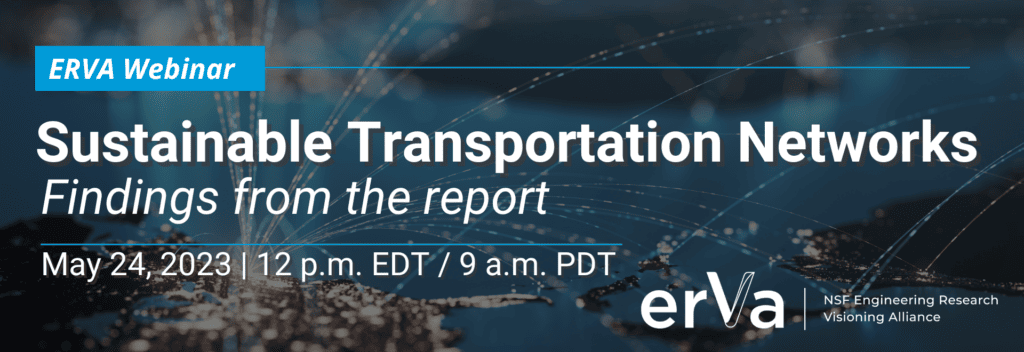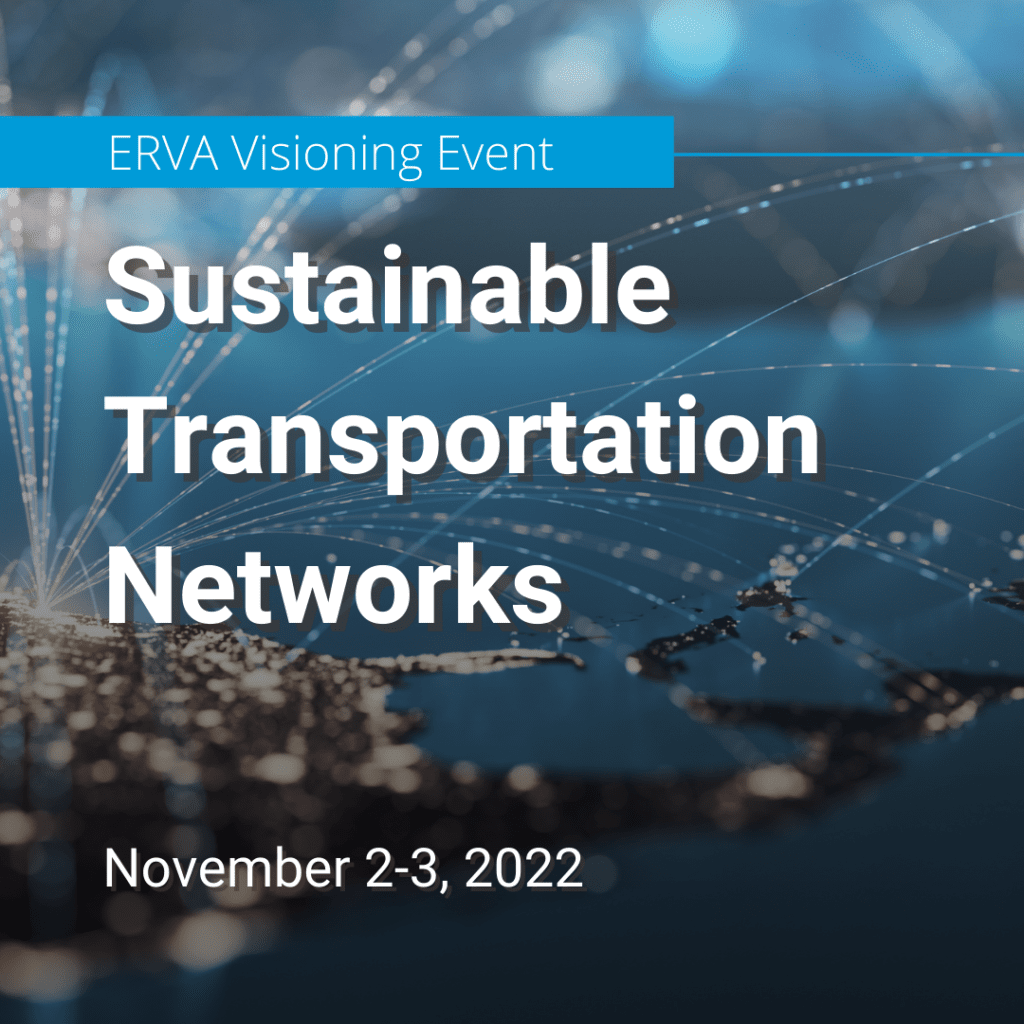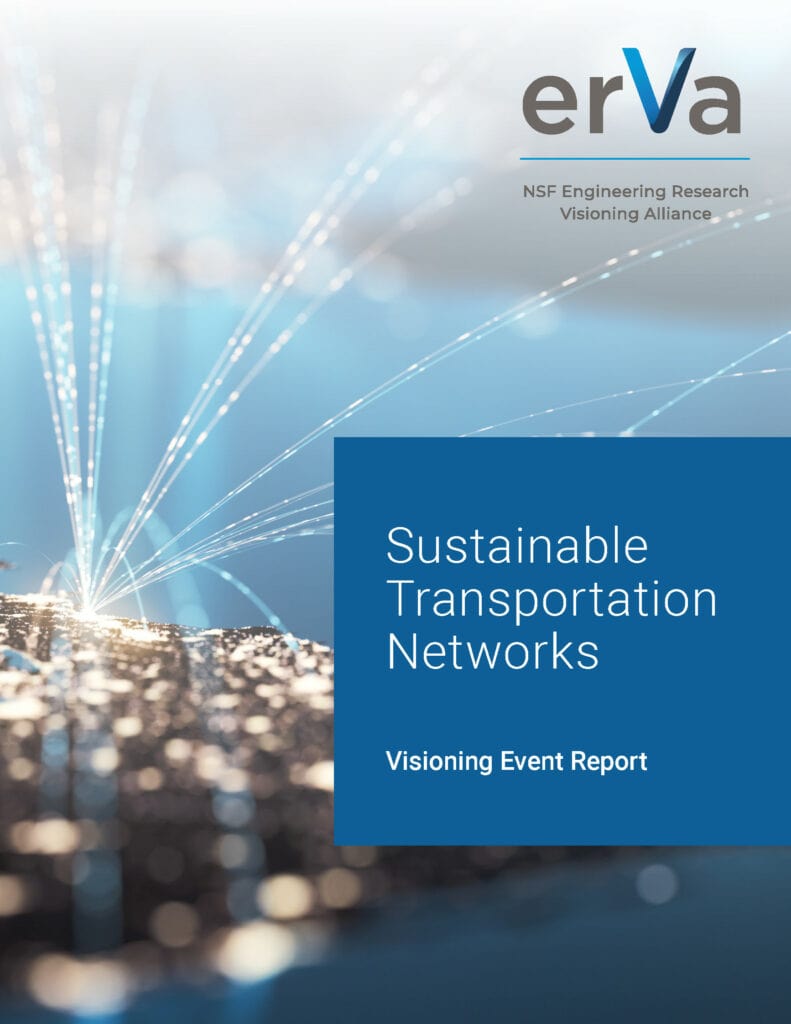The Engineering Research Visioning Alliance hosted a webinar May 24, 2023, to discuss the findings of ERVA's report, Sustainable Transportation Networks. The event featured Cathy Choi, chief sustainability officer and VP of engineering at ClearFlame; and Erin Bell, professor and chair, Department of Civil and Environmental Engineering at the University of New Hampshire, who co-chaired the ERVA visioning event that culminated in the report. The engineering research priorities discussed during the webinar were identified within four themes: infrastructure, vehicles and transportation modes, data, and our people and community. These are ripe directions for engineering research to lead and to enable sustainable transportation networks.

05•24•2023 @ 12:00 pm - 1:00 pm
Join ERVA and our Sustainable Transportation Networks visioning event co-chairs for a webinar to discuss the findings of the recently released report.
During this webinar, Cathy Choi, chief sustainability officer and VP of engineering at ClearFlame; and Erin Bell, professor and chair, Department of Civil and Environmental Engineering at the University of New Hampshire, will present engineering research priorities identified during the November 2022 ERVA visioning event. The priorities are identified within four themes: infrastructure, vehicles and transportation modes, data, and our people and community.These are ripe directions for engineering research to lead and to enable sustainable transportation networks.
This webinar is intended for the engineering research community from industry, academia, national labs, and the general community with a vested interest in the future of our transportation systems.
This is an informational webinar with an opportunity for Q&A with the speakers at the end. Participation is welcome and encouraged.
Engineering Research Visioning Alliance’s (ERVA’s) latest report outlines how engineering research can help shape the future of sustainable transportation
April 27, 2023 –Whether moving people or freight, transportation is the largest user of energy in developed countries and the most rapidly growing energy consumer in developing nations. Achieving a future where transportation works efficiently and sustainably is the focus of a new report from the Engineering Research Visioning Alliance (ERVA), an initiative funded by the U.S. National Science Foundation. It articulates bold engineering research priorities to advance a future with fully sustainable transportation networks. It also aims to inspire researchers and funders (public, private, and nonprofit) to support and pursue these research priorities. The executive summary and full report can be found on ERVA’s website.
As the world faces increasing energy and climate challenges, engineering research is well positioned to address the science and technology needs for transportation modes, infrastructure and networks – both physical and digital—in a way that is sustainable, fair and equitable to all communities.
“One of the greatest challenges in creating a sustainable future is how we move people and goods,” said Erin Santini Bell, professor and chair of the University of New Hampshire’s Department of Civil and Environmental Engineering and co-chair of the ERVA Thematic Task Force that framed the visioning event. “This report offers a framework for the entire engineering research community to invest their resources and talent to address the problems surrounding transportation networks and their broader impact on society.”
The report illuminates three approaches for future transportation research: leveraging data-informed operations to improve transportation systems; advancing sustainable technologies that incorporate versatile materials; and the overarching need to improve equity and accessibility through transportation device and service design.
Although electric vehicles are often the centerpiece of today’s sustainable transportation discussions, developments in electrified transportation represent just one aspect of the overall challenge. ERVA convened a diverse array of experts, practitioners, and academics to identify engineering research priorities in four key areas: infrastructure, vehicles and transportation modes, data, and the community.
“Transportation networks of the future will be safe, efficient, resilient, and sustainable, with more cooperative traffic patterns facilitated in part by GPS-increased accuracy,” said Cathy Choi, chief sustainability officer and vice president of engineering at ClearFlame and a co-chair of the ERVA Thematic Task Force. “However, to address gaps and barriers, we must build trust in critical ways—not simply by having these systems be safe and efficient, but by considering the real-world usage and affordability needs of all users.”
Sustainable Transportation Networks is the fourth report released by ERVA, an initiative funded by the NSF to help identify future engineering research directions. To read the report, visit ERVA’s website. View the previous ERVA reports, Engineering R&D Solutions for Unhackable Infrastructure, Leveraging Biology to Power Engineering Impact, and The Role of Engineering to Address Climate Change.
ERVA is funded by an the National Science Foundation.
About The Engineering Research Vision Alliance (ERVA):
The Engineering Research Visioning Alliance (ERVA) is a neutral convener that helps define future engineering research directions. Funded by the NSF Directorate for Engineering, ERVA is a diverse, inclusive and engaged partnership that enables an array of voices to impact national research priorities. The five-year initiative convenes, catalyzes and enables the engineering community to identify nascent opportunities and priorities for engineering-led innovative, high-impact, cross-domain research that addresses national, global and societal needs. Learn more at www.ERVAcommunity.org.
The event brought together more than 80 researchers and technology experts to ideate over two days
Nov. 3, 2022 — Beyond today’s planes, trains, ships, and automobiles, the future of transportation requires new infrastructure, networks, and modes to get from point A to point B. This week, researchers from academia, industry, and government sectors convened to identify priorities for engineering research to address sustainable transportation networks at a virtual visioning event coordinated by the Engineering Research Visioning Alliance (ERVA), a U.S. National Science Foundation-funded initiative.

The ERVA visioning session was structured to spur creative, bold thinking and gather future-focused research ideas from innovators and researchers in a range of transportation specialty disciplines. A thematic task force co-chaired Erin Santini Bell, University of New Hampshire, and Cathy Choi, ClearFlame, who also serve on ERVA’s Standing Council, structured the proceedings over two days to identify specific areas that are at the edge of the thought horizon or are underexplored and require additional research and have the potential for the greatest return on investment.
“The ERVA platform is a springboard for interdisciplinary thinking, custom-designed to bring together the minds and expertise to address a complex challenge like transportation,” Bell said. “The ideas this group synthesized will plant the seeds for the engineering community to develop innovative approaches for a smart, community-centered, resilient, and sustainable future.”
ERVA visioning events provide a unique opportunity for selected participants to advance the goal of catalyzing the pursuit of innovative, high-impact research that benefits society and the planet. The participants considered new transportation vehicles, networks and modes that emphasize efficient energy usage, produce low or no emissions, utilize alternative materials and novel construction and manufacturing processes, enhance the efficiency of freight and logistics, and leverage appropriate levels of automation and connectivity. Safety, affordability, and diversity, equity, inclusion, and accessibility in mobility are characteristics considered essential to drive the positive impacts on social and economic conditions that will benefit society.
“This was a tremendous opportunity to integrate innovative and diverse engineering research perspectives to address one of society’s grand challenges," Choi said. “Bold thinking lays the foundation for us to stay at the forefront of engineering and technology by identifying tomorrow’s ideas, fostering transformational engineering research, and laying the groundwork for our next generation of great engineers.”
Event participants were identified and invited based on their research and expertise and represent scientists across academic disciplines, geographic location, organization sector and type, gender, race/ethnicity, and career stage. Specific themes explored include infrastructure, vehicles and transportation modes, engineering research in data to support future transportation networks, and systematic engineering practices to improve transportation needs for all communities.
ERVA was established to provide the engineering community with a process for identifying bold and societally impactful engineering research directions that will place the U.S. in a leading position to realize a better future for all. It is an engaged, inclusive, multilayered partnership, providing a truly diverse array of voices with the opportunity to impact national research priorities.
The results of the proceedings will be distilled and disseminated via a thematic report that will help set priorities for the future of engineering. The report will include high-value findings that will identify less-explored, basic and use-inspired lines of research ripe for the engineering community to pursue to enable a future with optimized transportation via land, sea, air, and the next generation of travel modalities.
Learn more about this visioning event and the work of the thematic task force, and sign up to receive updates and the results report.
About ERVA
The Engineering Research Visioning Alliance (ERVA) is a neutral convener that helps define future engineering research directions. Funded by the National Science Foundation (NSF) Directorate for Engineering, ERVA is a diverse, inclusive and engaged partnership that enables an array of voices to impact national research priorities. The five-year initiative convenes, catalyzes and enables the engineering community to identify nascent opportunities and priorities for engineering-led innovative, high-impact, cross-domain research that addresses national, global and societal needs. Learn more at www.ERVAcommunity.org.
Follow ERVA:
LinkedIn: https://www.linkedin.com/company/ervacommunity
Twitter: https://twitter.com/ervacommunity Facebook: https://www.facebook.com/ERVAcommunity
